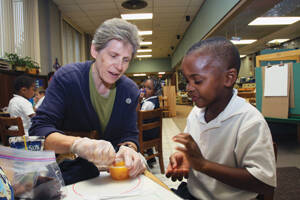A drop-off in the reach of U.S. summer nutrition programs in 2010 and ongoing budget-cutting at state and local levels suggest that many schoolchildren in the United States will face another summer of hunger this year. According to a new report from the Food Research and Action Center, despite record numbers of children receiving free and reduced-price meals during the 2009-10 school year, participation in federal summer nutrition programs fell nationally in 2010. FRAC reports that in July 2010 only 15 children received nutrition aid for every 100 low-income students who received lunch during the 2009-10 school year.
According to FRAC, budget cuts in many states caused school districts to eliminate or reduce their summer programs. Fourteen states served less than one-tenth of their low-income children through summer nutrition programs in 2010; five states—Oklahoma, Mississippi, Kansas, Colorado and Louisiana—served fewer than 1 in 15.
The summer programs extend food aid to eligible children when they are out of school at participating sites at schools, parks and public and nonprofit agencies. During the school year, the U.S. Department of Agriculture reports serving as many as 21 million children. But according to the FRAC report, titled Hunger Doesn’t Take a Vacation, summer nutrition programs reached just 2.8 million children on an average day in July 2010. That continues a three-year decline despite broad evidence that hunger is increasing as a mostly jobless recovery persists nationwide.
In fact, in the 2009-10 school year, the number of low-income children eligible for the school lunch program grew by a record 1.1 million. In March 2011, participation in the Supplemental Nutrition Assistance Program rose to a record 44.6 million people, an increase of more than 4.4 million people over March 2010. “While participation in other federal nutrition programs grew rapidly because of the recession,” said Jim Weill, president of FRAC, “participation in the Summer Nutrition Programs continued to slide. It’s time to reverse this trend.”
The center suggests that summer programs would benefit from better publicity and better follow-through among school administrators as they plan their summer school sessions. According to FRAC, millions in federal aid to support nutrition programs over the summer is left on the table by some states.
The U.S. Department of Agriculture appears to be aware of the problem. In early June it sponsored Food That’s In When School Is Out, an awareness campaign to promote summer programs and encourage partnerships with not-for-profit and faith-based community groups. (The locations of summer feeding sites are available from the National Hunger Hotline at 866-3-Hungry or 877-8-Hambre.)
“The Summer Nutrition Programs are a vital part of our nation’s nutrition safety net,” said Crystal FitzSimons, co-author of the report. “There is a foundation on which we can build and which we cannot afford to weaken further.... It’s not too late to make a difference for this summer and for the next.”








